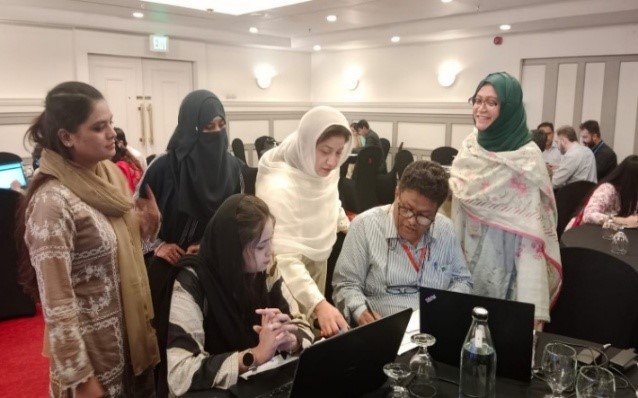
The ongoing collaboration between the UK Health Security Agency (UKHSA) International Health Regulations Strengthening Project (IHR-SP), Pakistan’s National Institute of Health (NIH), the Directorate General Health Services in Sindh, and Sindh Health Care Commission (SHCC) has successfully launched the country’s first comprehensive provincial laboratory network, bringing together both public and private laboratories to strengthen outbreak detection and response.
Closing a critical gap
Significant progress in the Integrated Disease Surveillance and Response (IDSR) system has been made in Pakistan’s Sindh province, where the country’s first IDSR Laboratory Network was established. Since January 2025, the network has included public sector laboratories from secondary and tertiary care hospitals across the province where a structured system for reporting both cumulative and case-based data of laboratory-confirmed priority diseases has been successfully operational through the digital platform District Health Information System (DHIS-2). However, laboratory-based disease surveillance remains incomplete without integrating private sector laboratories, as approximately 70% of patients in Pakistan utilise private sector health facilities and laboratories. Historically, laboratory data on priority disease from the private sector has never been integrated with national or provincial public health systems and authorities. The absence of this reliable and comprehensive data restricts the province’s ability to fully assess disease burden and promptly detect potential outbreaks.
First IDSR training for private laboratories in Sindh
Technical advisers from UKHSA’s IHR-SP worked alongside Pakistan’s NIH and the SHCC, a regulatory body for private healthcare services, to expand the IDSR laboratory network to private sector laboratories. During a three-day launch event in Karachi (5–7 August 2025), 48 laboratory leaders and technical staff alongside government officials from the Provincial health department and Provincial Public Health Reference Laboratory (PPHRL) were brought together to understand the role of private laboratories in the IDSR lab network and how they could contribute to improving Pakistan’s surveillance systems.
There was also an extensive training session on laboratory data reporting using digital platform of DHIS-2. Guided by UKHSA laboratory and IT technical advisers, participants practiced lab data capturing and analysis using aggregate and case-based reporting tools with hands-on exercises in data entry, visualisation, and dashboard use. Participants applied their learning through dummy data exercises and scenario-based practice by entering, analysing and interpreting data, developing dashboards and presented their findings. The event also included discussions on the proposed data flow mechanism between private and public sector laboratories within the Sindh IDSR Laboratory Network to ensure alignment and smooth reporting into the national system.

 Image: participants undergoing a training station on laboratory data reporting using DHIS-2
Image: participants undergoing a training station on laboratory data reporting using DHIS-2
Laboratory leaders expressed strong support for the initiative, recognising its potential to improve both public health outcomes and the quality of their own services through better disease intelligence. A reporting date was successfully agreed, with laboratories beginning data sharing just a week later.
Looking ahead
This event marked an important milestone in expanding the IDSR Laboratory Network to private sector laboratories of Sindh and in building their capacity to capture, integrate and analyse laboratory data using the digital platform of DHIS-2. It was also decided that joint meetings of public and private sector laboratories will promote shared learning and exchange of experiences.
The Sindh success provides a model for expansion across Pakistan's other provinces. The approach, combining regulatory partnership through the Sindh Healthcare Commission with technical training and digital infrastructure offers a template that other provinces or countries facing similar surveillance challenges could adapt.
This achievement represents a significant step forward in Pakistan's disease surveillance capabilities whilst demonstrating how international partnerships can deliver practical benefits for global health security.
Also By
Useful Resources
Related Articles
-
From vision to action: Sindh’s IDSR Lab Network Review marks key progress in Pakistan’s IDSR journey
BY Dr Muhammad Sartaj -
Gilgit-Baltistan launches new laboratory network in efforts to strengthen Integrated Disease Surveillance and Response across Pakistan
BY Dr Muhammad Sartaj, Sumera Abid -
Building a stronger health partnership with academic institutions for strengthening IHR in Pakistan: IDSR training for Master Trainers at The Institute of Public Health, Lahore
BY Dr Muhammad Sartaj -
Pioneering training on “District Health Information System-2” to strengthen Integrated Disease Surveillance and Response System in laboratories in Sindh province of Pakistan
BY IHR -
Quarterly Review Meeting on Integrated Disease Surveillance and Response (IDSR) System and District Dashboard Data Analytics Review Workshop, Gilgit-Baltistan August 2024
BY IHR
Please Sign in (or Register) to view further.